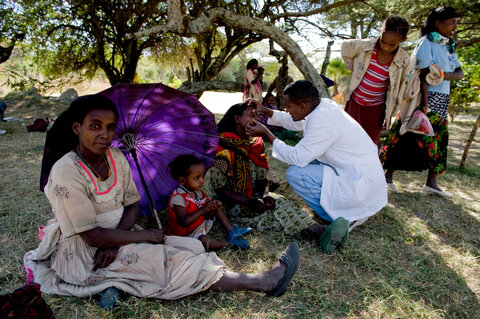Fighting neglected tropical diseases: The case for participation and human rights based approaches

KH Martin Kollmann for the International Coalition for Trachoma Control
Neglected tropical diseases (NTDs) are causes and consequences of poverty, disability and marginalization. They disproportionately affect the world's poorest communities and can have profound physical, mental, social and socioeconomic effects on those who lack the resources for prevention, treatment and care. Thus NTD programs can be viewed as an investment in the poorest and most marginalized communities and a critical step towards reaching the 2030 Sustainable Development Goals (SDGs). But how do we minimise the adverse effects of NTDs to support the achievement of the SDGs? What measures do we need to put in place to ensure those affected are not sentenced to poverty, marginalization, discrimination or exclusion?
Hint: Key answers lie in participation and human rights based approaches.
The involvement of communities and people affected is not a new concept in primary health care and disease programs. The 1978 Alma-Ata Declaration emphatically states that all “people have the right and duty to participate individually and collectively in the planning and implementation of their health care”. However, the active participation of people affected by NTDs is not always a reality. Human rights based approaches to NTDs emphasize that any interventions should be based on the principles of participation, non-discrimination and accountability.
The signing of the Universal Declaration of Human Rights in 1948 was a milestone moment for human rights. It was the catalyst for more than 80 international conventions and treaties including the Convention on the Rights of Persons with Disabilities. These treaties and conventions collectively recognize and codify the rights of persons who are disabled, women, children, indigenous peoples and other marginalized groups. People with NTDs often fall into several of these mutually overlapping categories, which is why participatory and human rights based approaches are particularly relevant in the design and implementation of our programs and our advocacy work.
NTDs can cause chronic disability and are highly stigmatizing, which often leads to discrimination, marginalization and exclusion. In many countries, two thirds of persons with disabilities are unemployed and those who have jobs often only work part time. This is particularly true for people who experience advanced trachoma, the world's leading infectious cause of visual impairment and blindness.
Trachoma, like other disabling NTDs, reduces economic productivity and increases social exclusion, which can cause family breakdowns and abandonment. As a result, many women, who are disproportionately affected by the disease, downplay or conceal visual impairment and pain for fear of exclusion or stigmatization. Similarly, other disabling NTDs, such as river blindness, lymphatic filariasis, leprosy and Buruli ulcer, can lead to severe stigma, associated mental health problems and social exclusion. These social consequences are often described by those affected as the greater disability.
Participatory and human rights based approaches, such as Disease Management Disability and Inclusion (DMDI), address these often-neglected aspects of NTD work as a crosscutting theme. They are guided by the principal that people affected by NTDs are essential to the success of programs. Having experienced the disease, disability and associated discrimination, people affected by NTDs have a unique voice and perspective, they bring passion to the work and take the programs closer to the communities they are designed to benefit.
Placing persons affected by NTDs at the center of our program work requires a major paradigm shift, which has profound implications on how services are planned, delivered and evaluated. However, examples from the field have shown that when affected people and communities are given ownership to actively plan, implement and evaluate activities, it leads to better outcomes, improves cost-efficiency and enhances sustainability. This has been seen in several programs including the The African Programme for Onchocerciasis (Community Directed Treatment with Ivermectin/CDTI), the Community-based Lymphedema Management for Lymphatic Filariasis in Odisha State, India and the Comprehensive Rural Health Project in Jamkhed, India.
Participation and human rights based approaches are particularly relevant for the last mile of NTD elimination. By enhancing the recognition, systematic inclusion and valued participation of affected people and communities, these approaches assist in creating sustainable, comprehensive and inclusive NTD programs that are fully integrated into national health systems.
Much progress has been made in recent years to recognize the importance of participatory human rights based approaches into development programs. The NNN BEST conceptual framework (Behaviour, Environment, Social inclusion, Treatment and care) provides a practical platform for translating these approaches into programs - including DMDI and other cross-cutting areas such as Water, Sanitation and Hygiene (WASH) - and embeds cross-sectoral approaches and systems thinking in our work.
In 2015, the international community explicitly recognized the importance of NTDs, calling for their end in SDG 3.3. Moreover, through SDG 3.8 the international community reiterated its commitment to the equality and human rights of all people by including universal health coverage as a key goal - a principal that lies at the core of our NTD work. With over one billion of the world's people affected by NTDs, it is clear that upholding these human rights will have to happen in a sustained and participatory approach if we are to achieve our goals with no one left behind. The NTD community should be at the forefront of making this a reality.
Related resources:
- The voice of people affected can contribute to priority-setting in research in Neglected Tropical Diseases - Julian Eaton and Muhammed Jidda Assakin
Photo shows 28-year-old Simbo who has trachoma. She had her eyes checked by a medical staff member Abera Kiada Alambo in Ethiopia and subsequently underwent surgery. Copyright: CBM/Hartung